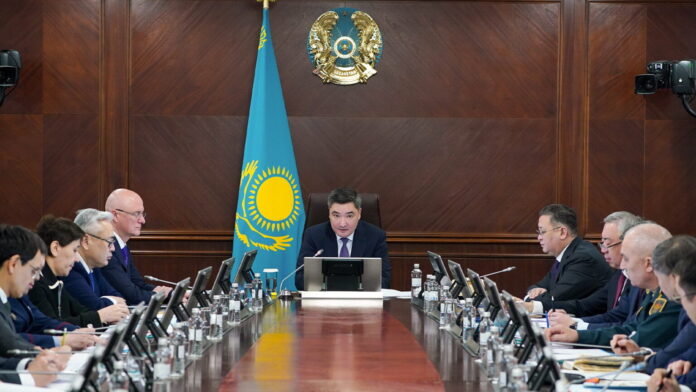News Desk
ASTANA – Olzhas Bektenov, the newly appointed Kazakh Prime Minister, outlined primary tasks at a Feb. 9 meeting, in accordance with instructions given by President Kassym-Jomart Tokayev at an expanded government session on Wednesday.
The Prime Minister stressed the need to prioritize the budget expenditures with a focus on obtaining a total economic return while completely excluding unproductive spending.
He instructed the Finance Ministry to audit the national budget within 10 days and local ones – within a month significantly reducing non-essential expenditures.
Bektenov noted the need to rewrite the Tax Code considering the opinions of the expert and business community.
“It is necessary to create conditions favorable for businesses to grow, without fear of fiscal costs and administrative burdens,” he said.
Industrial development
Bektenov instructed First Deputy Prime Minister Roman Sklyar to involve all major industrial enterprises, particularly in the extractive industries, to present specific plans for establishing production facilities of high conversion.
He emphasized that domestic industrial companies should increasingly purchase Kazakh goods, works, and services to conclude appropriate agreements.
Construction, energy, and water industries
The Prime Minister stressed the importance of using domestic building materials and conducting audits to address cost overestimation.
He necessitated reliable power supply to industrial enterprises, setting a target of introducing over 700 megawatts of additional generation this year.
Bektenov instructed the Water Resources and Irrigation Ministry to prepare a set of measures for rational water consumption and initiate a water conservation campaign.
Regarding the construction of plants for processing solid domestic waste, he demanded proposals to attract private investment within a month.
Social block
The Prime Minister called for reforms in the healthcare insurance system, emphasizing the importance of digitization and transparency.
He gave specific instructions on digital transformation, transportation, agriculture, implementation of the Comfortable School and Modernization of Rural Healthcare national projects, and reforming mechanisms of social support of citizens, public procurement and public-private partnership.
It is crucial to move away from stereotypes, completely eradicating formalism and red tape, Bektenov said, noting that ministers should promptly solve sectoral issues at their level independently.
“Everyone needs to understand that the pace of work will be increased, and work will be demanding,” he concluded.



